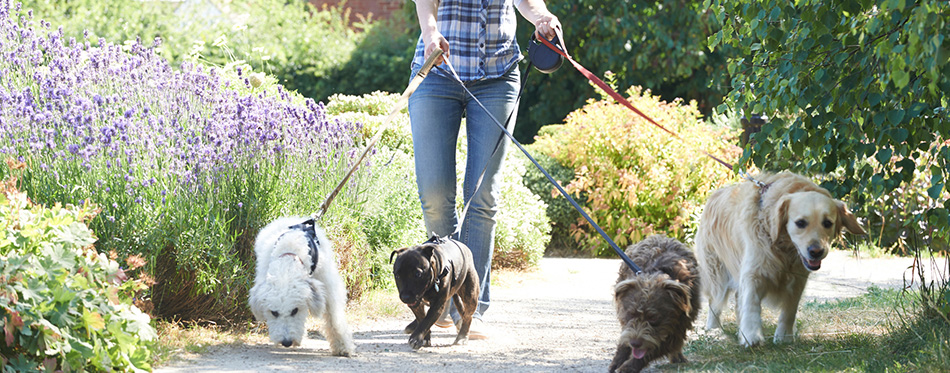It’s no secret that dogs need daily physical activity to maintain optimal physical and mental well-being. But what if your normal schedule changes and you find yourself unable to walk your pup every day? Maybe you have a new job, or it’s a busy season at work, or maybe you just had a baby; whatever your reason, finding a dog walker can help both you and your furry companion tremendously. Having a professional dog walker can give your pet the attention and exercise that they need when you can’t be there. It can also allow you to come home to an already exercised and socialized dog who won’t bark at you incessantly or stare at a door anxiously. In other words, it can allow both you and your pup to relax.
However, hiring a dog walker is not an easy task – who you leave your pet with matters. Here are some tips on how to find the right dog walker, one that is qualified and makes a good match with your pup.

How to Find a Dog Walker
Because anybody can advertise themselves as a dog walker (even people who’ve never owned a dog in their life!) it’s important to take your time when searching for a candidate. Thankfully, there are many qualified dog walkers out there that would make a great match with your pet. Here is how you can go about finding them.
Ask for Recommendations
- Friends, Family, and Neighbors
You want to start by asking your dog-owning friends, family members and neighbors for recommendations. Your network of trustworthy people is the best place to start as you’ll get to hear first-hand experiences, recommendations and advice. If none of your friends, family or neighbors use the services of pet walkers, you can try asking around your local dog park – some of the dog owners are bound to have used dog walking services at some point!
- Your Vet and Dog Trainer
Many veterinarians know people who do dog walking either as their primary job or their second job, so asking them for a recommendation is always a good idea. In fact, many vet nurses do pet sitting and walking on the side! This can be the best possible solution if your pup requires medication(s) in addition to their walks. You can also ask your dog trainer for a recommendation, or even ask them if they themselves do dog walking on the side. This would be perfect if your pooch is in need of more rigorous exercise and/or some improvement in the behavioral skills department.
- Scour the Internet
Today, everything and everyone can be found on the Internet, including dog walking companies and individual pet sitters and walkers. Instagram, Facebook and other social media platforms are good places to look, and so are online pet services like Wag! Rover and DogVacay.
Ask the Right Questions
Once you’ve found a potential candidate, or better yet, multiple candidates, it’s important to ask them different questions to see if they’re indeed a good match with your dog. You also need to be certain that both you and your pup are comfortable with the new person. After all, most dog sitters are given access to the owner’s house, so you really do need to be confident they’re a person of trust. Here are a few important questions to ask.

About the Business
- How long have you been in the dog walking business and what is your general experience with dogs?
- Do you have a license and are you insured (ask for proof!)?
- What are your training methods?
- Can you provide a couple of references?
- What are your rates and how and when do you prefer to be paid?
- What is your cancellation policy?
About the Walks
- Are you the only person who will walk my dog? And if so, is there someone who can cover for you when you’re sick or on vacation?
- Do you normally walk more than one dog at a time? And if so, how many dogs do you walk at once?
- Where will you walk my dog and how long will the walks be?
- If the walks don’t happen near my home, how will you transport my dog? If you plan to use a car, do you know how to properly restrain a pet in a vehicle?
- Can you send me pictures and updates from the walks?
- Can you provide short report cards about my dog’s energy levels, mood and behavior during walks?
- Can I accompany you on a trail walk?
You may also like our articles on Dog Leashes and Dog Collars.
About Health and Safety
- Can you meet all of my dog’s needs, including medical conditions, behavioral issues, etc?
- Are you certified to perform canine first aid, including CPR? Also, what are your emergency protocols?
- Do you know where the local animal ER is?
- Can you recognize the signs of heat exhaustion and heatstroke?
- Do you know how to break up a dogfight in case there is one?
Try Out a Potential Dog Walker
Once you’ve met your potential pet walker and have asked them all the questions you felt needed to be asked, it’s time to actually try them out. This is crucial because many people can be great on paper but not jibe well with you and/or your dog. To see if your candidate is a good fit, go for a trial walk together. While some folks may think this is too much, we are of the opinion it isn’t. Sure, you may end up paying for a walk but not liking the candidate, but at least you’ll leave knowing what you want and don’t want in a pet walker. The truth is, trial walks are often the only way to know whether or not you and your pup are comfortable with a walker.
Go on a trial walk with eyes wide open. Pay close attention to how the pet walker and your pooch interact, as well as how the walker behaves in general. Here are a few questions to ask yourself during and after the walk:
- Is the dog walker relaxed and natural around my dog?
- Does my dog seem comfortable around them?
- Is my dog responding well to the walker’s directions and cues?
Bear in mind that the walker will likely be on their best behavior during the trial walk, however, you should still be able to get a general sense of whether they’re a good fit for you and your pet.
During the trial walk, you may also want to give some instructions to the walker. Let them know important things about your dog and their habits, such as the routes they like the most, their preferred walking speed and more. For example, if you have an older dog, let the walker know they need to walk at a slower pace. Likewise, if your pup is on the heavier side and needs to lose weight, let them know you’d prefer brisk walks or even jogs for your dog.
Related Post: Dog Food for Weight Loss

You Like Your Dog Walker Candidate. Now What?
If your candidate has answered all of your questions in the way you appreciate, your dog is comfortable around them, and they, in general, seem like a responsible and competent person – congratulations! It’s time to hire a dog walker.
Choosing a dog walker is not where your job ends, though. After you hire the person you like, you need to make sure they have everything they need to keep your pup healthy and happy while you’re away. Provide all the information you think your new walker may need, including:
- Your contact info such as a phone number and/or email address
- Your vet’s contact information, as well as their address
- Feeding instructions in the event they have to feed your pet
- Information about any medication your dog needs or may need, as well as the instructions on how to administer it.
Also, make sure you’re getting what you’re paying for. Like any other business or otherwise relationship, this relationship too may change over time (sometimes even overnight). To ensure your dog is getting the best possible care, it’s important to continue keeping a watchful eye and checking on the dog walker every now and again. It’s a good idea to ask the walker to provide a brief daily update – post-it notes, brief phone messages or short emails all work great, so choose the means of communication that work best for both you and the walker.
Pay attention to your dog’s behavior too. If they seem their usual self, healthy and happy, all is probably great. If they start exhibiting new and strange behaviors, such as fear, aggression or anxiety, you’ll have to talk to the walker and see what is going on. If you know that your pet has specific quirks during their walks, ask the walker if they noticed them. Their answer should give you valuable insight into whether they’re really present and attuned to your pet while taking care of them. It’s not unreasonable to ask your neighbors to keep an eye out and let you know if they see anything unusual or suspicious.
Finally, give feedback. Let the walker know when you think they’re doing a great job, and also let them know if something needs to change. Respect their schedule, pay them on time and don’t forget to say thanks!

